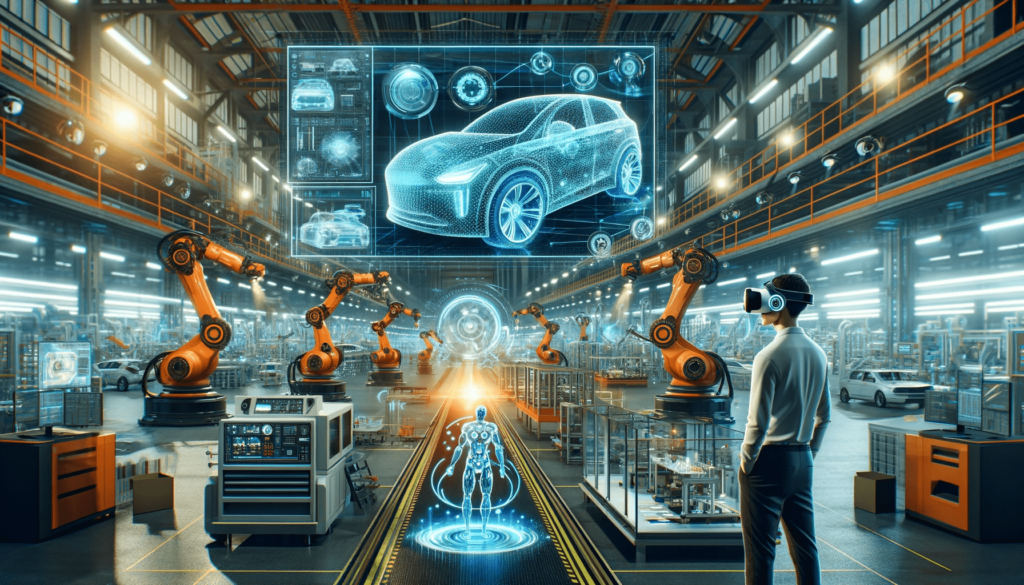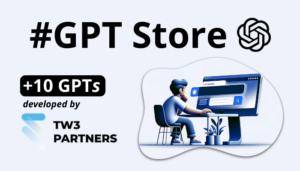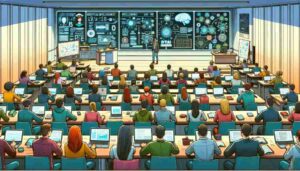At a time when technology is constantly redefining the boundaries of innovation, the Renault group positions itself at the forefront with its ambitious project, the Industrial Metaverse. This article, written from an external observer’s perspective, examines this revolutionary initiative that promises to radically transform the automotive industry.
Introduction to Renault’s Industrial Metaverse
Renault’s Industrial Metaverse is not just a technological evolution; it is a revolution in the design and management of industrial processes. Through this initiative, Renault is redefining industry standards.
What is the Industrial Metaverse?
The Industrial Metaverse blends augmented reality, artificial intelligence, and blockchain to create a virtual production ecosystem. This combination allows Renault to simulate its manufacturing processes in extremely detailed ways, paving the way for unprecedented efficiency and agility in automotive construction.
Renault’s Objectives with the Metaverse
Renault’s primary goal with the Metaverse is threefold: to increase productivity, reduce costs, and accelerate the development of new generations of vehicles. Beyond these practical aspects, the Metaverse is also a strategic tool for Renault in its pursuit of sustainability and energy efficiency.
Discover the potential of generative AI to optimize your processes, create new growth levers, and secure your digital transition.
TW3 Partners supports you with strategic solutions tailored to your business.
Your digital transformation starts here
Technological Foundations of Renault’s Metaverse
The implementation of the Metaverse by Renault relies on several cutting-edge technologies, each playing a key role in transforming the industry.
Integration of Virtual Reality and AI
At the heart of Renault’s Industrial Metaverse, virtual reality and artificial intelligence enable the simulation and optimization of production processes in real-time. These technologies offer an unprecedented insight into operations, allowing for virtual testing, adjustments, and ultimately predictive maintenance.
Blockchain and the Automotive Industry: A New Era
The integration of blockchain into the Industrial Metaverse ensures data security, traceability, and integrity. For Renault, this means more transparent supply chains, better inventory management, and enhanced quality assurance.
Impact on the Automotive Industry
The implementation of Renault’s Industrial Metaverse is not just a step forward for the company; it marks a turning point for the entire automotive industry. By adopting this technology, Renault is not just following trends, but creating them.
Transformation of Manufacturing Processes
The Industrial Metaverse allows Renault to completely rethink its manufacturing processes. Thanks to real-time simulation and analysis, the company can test new methods, anticipate potential problems, and optimize production. This approach reduces lead times and costs while improving the overall quality of vehicles. The carbon footprint is also significantly reduced (by 50%). The transformation process is already well underway: today, 100% of the production lines are connected.
Leverage our expertise to integrate artificial intelligence strategically—without compromising security or business consistency.
TW3 Partners supports you with a personalized and efficient approach.
Bring Your Business into the Generative AI Era
Supply Chain Management and Product Development
The supply chain and product development are also transformed by the Metaverse. With more accurate data and better visibility of the entire process, Renault can make faster and more informed decisions. This agility translates into an increased ability to quickly respond to market demands and innovate in vehicle design.
Case Studies and Real-World Applications
To understand the real impact of the Industrial Metaverse, it is important to focus on practical applications.
Successes and Innovations at Renault
The Industrial Metaverse has already improved operations, whether in reducing production errors, speeding up the prototyping of new models, or enhancing employee training.
Other Industrial Initiatives
By introducing the Metaverse, Renault is defining a new industrial model. Other European industrial players are adopting a parallel approach, such as Volkswagen in Germany, which relies on its subsidiary Konnect Volkswagen Group, an open innovation hub in Tel Aviv.
Challenges to Face
Although it opens the door to particularly interesting future prospects, an innovation project of this magnitude is faced with many challenges, not just technical ones, like the usual data security issues. Renault will have to make these innovations acceptable within its staff. It will have to convince and train its employees.
Download our white paper to learn how to integrate generative AI efficiently, sustainably, and responsibly into your business.
Case studies, adoption strategies, orchestration, SEO, HR, marketing…
A concise collection of insights and practical advice to help you take action.
Generative AI: From Experimentation to Real Transformation
Forecasts and Future Developments
The possibilities of expansion into areas other than automotive are of course conceivable. Experts predict that this technology could become a standard element in the design and management of industrial processes in the near future. By capitalizing on its experience in the automotive sector, could Renault establish itself as the leader of the industrial metaverse?
Conclusion: The Evolution of the Metaverse in the Automotive Industry
In conclusion, Renault Group’s Industrial Metaverse is not just an innovation in the field of automotive manufacturing; it is a strong signal of the future evolution of the entire industry. With this bold initiative, Renault is not just following a pace set by its competitors. It aims to be a leader in a sector undergoing profound transformation.




